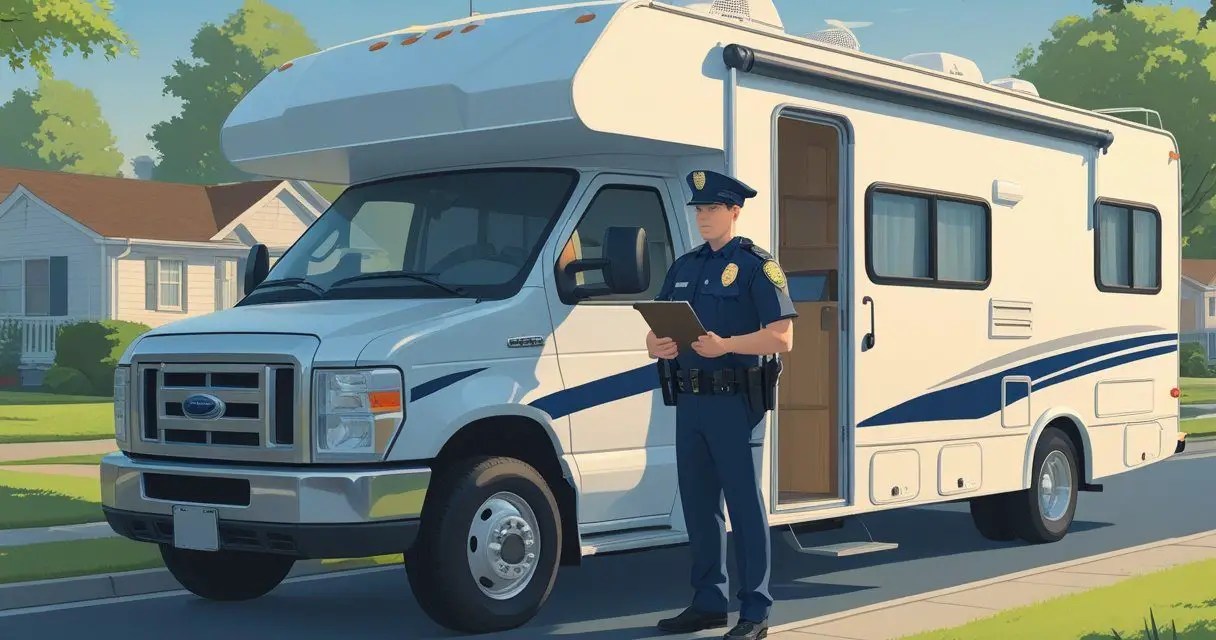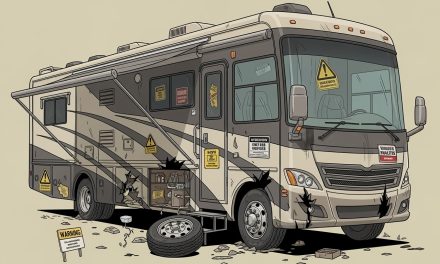Traveling in an RV gives you freedom and flexibility, but it also raises unique legal questions. One of the most important is whether police can search your RV without a warrant.
Police can search your RV without a warrant if it is treated as a vehicle and they have probable cause. If it functions as a home, they usually need a warrant.
The difference depends on how and where you use your RV. If it’s parked on a public road and ready to drive, the law often treats it like a car.
If it’s set up at a campsite with hookups or used as a residence, the law is more likely to treat it as a home with greater privacy protections.
Key Takeaways
- RV searches depend on whether it is treated as a vehicle or a home
- Police need probable cause or an exception to search without a warrant
- How and where you use your RV affects your privacy rights
Understanding RV Searches and the Fourth Amendment
When police search an RV, the law treats it differently depending on whether it functions as a vehicle or a home. Your rights under the Fourth Amendment remain, but how they apply depends on mobility, location, and how the RV is being used.
Fourth Amendment Protections for RV Owners
The Fourth Amendment protects you from unreasonable searches and seizures. In most cases, police need a warrant supported by probable cause to search your property.
Police cannot stop and search your RV at random. They must have a valid reason, such as evidence of a crime or a lawful traffic stop.
Even then, they usually need probable cause before they can look inside without your consent.
There are a few exceptions. For example, if you give voluntary consent, officers may search without a warrant.
If something illegal is in plain view, such as drugs or weapons visible through a window, they can seize it.
A search may also follow a lawful arrest if it is limited to the area within your reach.
If police conduct an illegal search, the evidence may be excluded in court.
How RVs Are Classified Under the Law
Courts decide whether your RV is treated like a vehicle or like a home. This classification matters because vehicles fall under the “automobile exception,” which allows warrantless searches if police have probable cause.
Homes, on the other hand, usually require a warrant.
Key factors include:
| Factor | Treated as Vehicle | Treated as Home |
|---|---|---|
| Mobility | On wheels, ready to drive | On blocks, not operational |
| Location | Public road or parking lot | RV park or long-term site |
| Utilities | No hookups | Connected to water, power, sewer |
| Appearance | Looks like transport | Looks like residence (awnings, furniture) |
Would you like to save this article?
For example, if you park your motorhome in a public lot and it can drive away at any time, police may classify it as a vehicle. But if it is hooked up to utilities at a campground and used as a residence, it is more likely to be treated as a home.
This distinction determines whether officers can rely on the automobile exception or must first obtain a warrant.
When Can Police Search an RV Without a Warrant?
Police may search an RV without a search warrant in certain situations tied to how the RV is being used, where it is located, and whether law enforcement has legal justification. These situations often involve probable cause, voluntary consent, or urgent conditions that make waiting for a warrant impractical.
Probable Cause and the Automobile Exception
If your RV is treated as a vehicle, police may rely on the automobile exception to the warrant requirement. This rule allows officers to search a vehicle without a warrant when they have probable cause to believe it contains evidence of a crime.
Courts look at whether the RV is mobile and being used for transportation. For example, an RV parked on a public road and capable of driving away is usually considered a vehicle.
In this case, the reduced expectation of privacy in vehicles applies.
Probable cause must be based on specific facts, not just suspicion. Smelling drugs, seeing illegal weapons through a window, or observing contraband in plain view can give officers the authority to search without first getting a judge’s approval.
If your RV is stationary, connected to utilities, or set up like a home, the automobile exception may not apply.
In those cases, police usually need a search warrant unless another exception is present.
Consent to Search
Police can also search your RV if you give voluntary consent. This means you agree to let them look inside without requiring a warrant.
Consent must be clear and not the result of threats, coercion, or misleading statements.
You have the right to refuse consent. If you say no, officers must rely on another legal basis, such as probable cause, to proceed.
Simply asking to search does not give them authority by itself.
It is important to understand that once you grant consent, officers can search areas that fall within the scope of your permission. For example, if you allow them to “look around,” that could include cabinets, storage compartments, and other spaces inside the RV.
Exigent Circumstances
Another situation where a warrant is not required is when exigent circumstances exist. These are urgent conditions where waiting for a warrant might cause evidence to be destroyed, a suspect to escape, or someone’s safety to be at risk.
For instance, if officers believe evidence inside your RV is about to be destroyed, they may act immediately. Similarly, if they suspect someone inside poses a danger, they can enter without a warrant.
Exigent circumstances are narrowly applied and must be justified by the facts at the time. Courts review these situations carefully to ensure law enforcement did not bypass the search warrant requirement without a valid reason.
This exception is not based on convenience. It is only used when urgent risks make it unreasonable to delay for judicial approval.
Key Legal Precedents and Court Cases
Courts have shaped how the Fourth Amendment applies to recreational vehicles through specific rulings. These decisions explain when an RV is treated as a vehicle and when it is considered more like a home, affecting whether police need a search warrant.
California v. Carney and Motorhome Searches
In California v. Carney (1985), the U.S. Supreme Court ruled that a motorhome parked in a public lot could be searched without a warrant under the automobile exception. The Court reasoned that the motorhome was “readily mobile” and similar to a car rather than a fixed residence.
This case set the standard for how courts decide if your RV is a vehicle or a home. Judges often look at mobility, location, and appearance.
For example:
- Mobile and on wheels → treated as a vehicle.
- Stationary with hookups → treated as a residence.
If your RV is parked on a street and ready to drive, police may rely on this precedent to justify a warrantless search with probable cause. But if it looks like a residence with utility connections, courts may require a warrant.
Impact of Other Supreme Court Decisions
Other cases reinforce the rules for RV searches. In Carroll v. United States (1925), the Court first created the automobile exception, allowing warrantless searches of vehicles if police have probable cause.
Later, in Pennsylvania v. Labron (1996), the Court confirmed that mobility plus probable cause is enough to search a car without a warrant.
These rulings apply to RVs when they function as vehicles. If you are driving your motorhome and police smell drugs or see contraband in plain view, they can search without first getting a warrant.
However, the Court has also emphasized limits. Police must still show probable cause and cannot rely on vague suspicion.
This means your RV is not automatically open to a search just because it has wheels. Officers must connect specific facts to the belief that evidence of a crime is inside.
Distinguishing Between Vehicle and Dwelling Use
Whether police need a warrant to search your RV depends on how it is being used at the time. Courts often weigh mobility, location, and living arrangements to decide if your motorhome is treated as a vehicle or as a residence.
RVs in Transit Versus Stationary Residences
When your RV is moving on public roads, the law usually treats it like any other vehicle. Under the automobile exception, officers can search without a warrant if they have probable cause.
For example, if they see contraband in plain view or smell illegal drugs, they may legally search the RV.
The reasoning is based on mobility. Because a motorhome can quickly leave the area, courts recognize a reduced expectation of privacy compared to a fixed home.
However, this does not mean officers can search at random. They must still show specific facts that justify the intrusion.
A simple hunch is not enough.
Permanent Parking and Residential Protections
If your RV is parked for long periods, hooked to utilities, or set up like a home, courts are more likely to treat it as a dwelling. In this situation, the search warrant requirement applies more strictly, and officers generally need a judge’s approval before entering.
Factors that suggest residential use include:
- Utility hookups (water, electricity, sewer)
- Physical setup such as awnings, steps, or patio furniture
- Lack of mobility like flat tires or being placed on blocks
When these conditions are present, your RV gains stronger Fourth Amendment protections. Police usually cannot rely on the vehicle exception and must follow the same rules as if they were searching a house.
Exceptions to the Search Warrant Requirement
Police do not always need a warrant to search an RV. Certain exceptions allow them to act without prior approval from a judge, but each has strict limits and conditions.
Search Incident to Arrest
When police lawfully arrest you, they may search the area within your immediate reach. This is called a search incident to arrest.
The purpose is to protect officer safety and prevent the destruction of evidence.
In an RV, this search usually covers the space near where the arrest happens. For example, if you are arrested in the driver’s seat, officers may check the glove box, center console, or floor area.
They cannot search the entire RV without another legal basis. The scope is limited to areas where you could quickly grab a weapon or hide evidence.
Courts often strike down searches that go beyond this narrow zone.
If officers want to look through cabinets, storage compartments, or sleeping areas, they need either probable cause, consent, or another recognized exception.
Inventory Exception
The inventory exception applies when police lawfully impound your RV. Officers may create an inventory of its contents to protect your property, guard against false claims, and ensure safety.
This is not supposed to be a search for evidence. Instead, it is an administrative process.
However, if officers find illegal items during a valid inventory, those items can be used in court. For the inventory exception to be valid, police must follow standard procedures.
They cannot use the process as a pretext to rummage through your belongings. Courts often review whether the department had clear written policies and whether officers followed them.
If your RV is towed after an arrest or traffic violation, expect an inventory search. Items like weapons, drugs, or stolen goods discovered during this process are usually admissible.
Inevitable Discovery Exception
The inevitable discovery exception allows evidence to be admitted even if police obtained it unlawfully, as long as they can show it would have been found legally anyway.
For example, if officers searched your RV without a warrant but later prove that a lawful inventory or warrant would have uncovered the same evidence, the court may allow it.
The burden is on the government to show discovery was truly inevitable, not just possible. Courts apply this exception carefully.
If the evidence could only be found through the illegal search, it will likely be excluded.
Terry Search and Reasonable Suspicion
A Terry search (or stop and frisk) allows officers to pat down a person for weapons based on reasonable suspicion. This standard is lower than probable cause but requires specific facts suggesting danger.
Applied to an RV, this means police may check your person or limited areas of the vehicle if they reasonably believe you are armed and dangerous.
For example, if you act nervously and make sudden movements near the driver’s seat, an officer may search that area for weapons. This exception does not permit a full search of the RV.
It is limited to ensuring officer safety during an encounter. Courts look closely at the officer’s observations to decide if reasonable suspicion existed.
If the suspicion is not supported by clear facts, any evidence found may be suppressed.
Practical Guidance for RV Owners
Police searches of RVs often depend on how you use the vehicle and where it is located. Your choices during an encounter with law enforcement, as well as the specific rules in your state, can affect whether officers need a warrant.
How to Respond to Police Requests
When law enforcement asks to search your RV, you have the right to say no unless they present a warrant or have probable cause. Consent must be voluntary, and once given, officers do not need a warrant.
You can also withdraw consent at any time. Stay calm and speak clearly.
If you refuse a search, do so respectfully. For example, you can say, “I do not consent to a search.”
Avoid arguing or obstructing, as that can escalate the situation. Remember that officers may still search without your consent under certain exceptions, such as the automobile exception or plain view doctrine.
If they claim probable cause, do not interfere. Instead, let the process occur and address the legality later in court if needed.
Keep important documents like your driver’s license, registration, and insurance ready. Providing these when requested can prevent unnecessary friction during the stop.
State Law Variations and Local Regulations
Rules for RV searches can differ depending on state law and local ordinances. Some states may extend stronger privacy protections to RVs treated as dwellings.
Other states apply broader vehicle search rules. For example, an RV parked long-term in a campground with utility hookups may be considered a residence under state law.
In contrast, an RV driven on a highway is usually treated as a vehicle, making it subject to the automobile exception. Local regulations may also affect how officers view your RV.
Some jurisdictions classify RVs as temporary residences if they show signs of habitation, such as awnings or outdoor furniture. Others focus mainly on mobility and location.
Checking state statutes or consulting legal resources before long trips can prepare you for different enforcement approaches.







